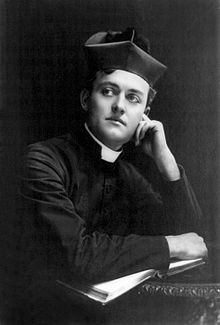Richard Bennett (actor)
Richard Bennett (born May 21, 1870 in Deacon , Indiana as Charles Clarence Bennett , † October 22, 1944 in Los Angeles , California ) was an American actor who was considered one of the most famous theater actors in the USA at the beginning of the 20th century.
Life
Richard Bennett was born in 1870 in a small Indiana village to George Washington Bennett and Eliza Huffman. He had a younger sister. Prior to his acting career, Bennett worked on a steamboat on the Great Lakes , as a professional boxer, as a medical showman, as a minstrel and as a night watchman in a Chicago hotel . He made his acting debut in The Limited Mail (1891) in a Chicago theater. After building a good reputation, he made his Broadway debut in New York in 1899 in the Charles Frohman- produced piece His Excellency the Governor . Numerous plays followed on Broadway over the next few years and Bennett's roles grew. It was in 1905 the protagonist of the play Man and Superman by George Bernard Shaw . By the mid-1930s, he played in over 35 Broadway plays. In addition to his work on Broadway, Bennett toured America for many years with his own theater company.
A number of major roles for Bennett followed and he became at times one of America's most popular theater actors. The handsome actor gained a large female following in particular and had a reputation as a " matinee idol". In 1908 he played the leading roles with Maude Adams in What Every Woman Knows . In 1912 he played the main role in the then controversial social piece Damaged Goods , which dealt with sexually transmitted diseases . Damaged Goods was made into a film with Bennett in the lead role in 1914 because of its great success. Although it was his first film, he also directed and wrote the script. Until 1943 he took over film roles at irregular intervals and thus played in a total of 28 productions. While he always played the leading role in his early films, he had to be content with supporting roles in his sound films from the 1930s onwards, often as an honorable and respectable authority figure. His most famous appearance today was as a family patriach in the drama The Shine of the House of Amberson (1942) by Orson Welles . He also had a central role as the dying millionaire in the star-studded film If I Had a Million (1932). Bennett had a negative opinion of the film business, however: it was not a job, but a madhouse.
His first wife, Grena Hellar, married Bennett in 1901, but they soon divorced. She later worked as an actress on Broadway and worked as a music critic for a newspaper. In 1903 he married the actress Adrienne Morrison (1883–1940). The two daughters were popular actresses Constance Bennett , Barbara Bennett and Joan Bennett . The marriage broke up in 1925 and Bennett married the much younger Aimee Raisch in 1927, who was previously married to a millionaire. The couple separated in 1934, but the marriage was not divorced until 1937.
Richard Bennett died of a heart attack in 1944 at the age of 74. He is buried next to his second wife in Pleasant View Cemetery, Lyme .
Filmography
- 1914: Damaged Goods (also screenplay)
- 1916: The Sable Blessing
- 1916: Philip Holden - Waster
- 1916: And the Law Says (also director)
- 1916: The Valley of Decision (also screenplay)
- 1917: The Gilded Youth
- 1917: National Red Cross Pageant
- 1919: The End of the Road
- 1919: Secret Marriage (screenplay only)
- 1923: The Eternal City
- 1924: Youth for Sale
- 1925: Lying Wives
- 1928: The Home Towners
- 1931: Five and Ten
- 1931: Bought!
- 1931: Arrowsmith
- 1932: This Reckless Age
- 1932: No Greater Love
- 1932: Madame Racketeer
- 1932: Strange Justice
- 1932: If I Had a Million (If I Had a Million)
- 1933: Big Executive
- 1934: Nana
- 1935: 18 minutes
- 1942: The Magnificent Ambersons (The Magnificent Ambersons)
- 1943: Hunted by Agents (Journey into Fear)
Web links
- Richard Bennett in the Internet Broadway Database (English)
- Richard Bennett in the Internet Movie Database (English)
- Richard Bennett in the database of Find a Grave (English)
Individual evidence
- ↑ The versatiles: a study of supporting character actors and actresses in the American motion picture, 1930–1955 Published 1969
| personal data | |
|---|---|
| SURNAME | Bennett, Richard |
| ALTERNATIVE NAMES | Bennett, Charles Clarence |
| BRIEF DESCRIPTION | US-American actor |
| DATE OF BIRTH | May 21, 1870 |
| PLACE OF BIRTH | Deacon , Indiana |
| DATE OF DEATH | October 22, 1944 |
| Place of death | Los Angeles , California |

